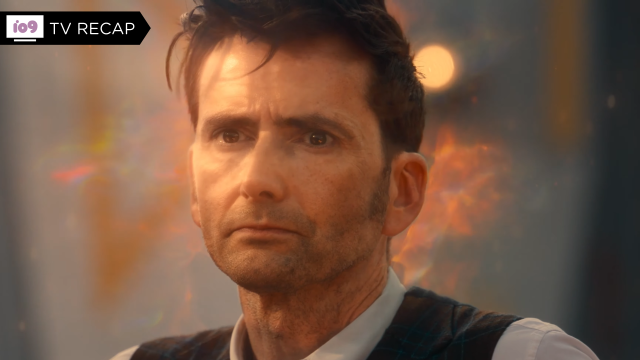For a show that is often so optimistically forward-thinking—and where change is baked into its hearts—Doctor Who often has a bittersweet view of its own past. Heroes and friends come and go, goodbyes are frequent and brief, and a lot of them are permanent, especially when part of the key to its longevity is that its main character dies every few years. But as a wise Time Lord once said, every once in a while, just occasionally, everybody lives.

“The Giggle,” the third and final episode of Doctor Who’s 60th anniversary specials, has a lot to do, between paying off the return and re-imagining of the 57-year-old villain Celestial Toymaker, climaxing this brief era of the 14th Doctor and Donna Noble, and, of course, grasping the weight of what it means to be a Doctor Who regeneration episode. Regeneration stories are not just the embodiment of Doctor Who’s ability to survive for decade after decade, but they also carry this dread weight of inevitability that often threaten to subsume the narrative framework they’re draped upon: they’re about the hero of the story dying. They are, especially in the contemporary iteration of the show, about how painful and tragic that is—metatextually, that a lead actor whose life has been defined by the series for a period of years putting an end point in their stewardship, but also textually, in that the Doctor has to grapple with this peculiar limbo of death and rebirth that sees them completely change their very self in a moment of fire and sacrifice.
The melancholy mood of regeneration stories perhaps has no better emblematic example than the last time David Tennant faced this prospect almost 13 years ago. Both parts of “The End of Time” are about the Doctor desperately struggling to avoid this inevitability, undergoing a two-hour grief process where the Doctor repeatedly stresses to the people around him, and to the audience, just how much this all sucks. The Tenth Doctor bitterly refers to regeneration to Wilf as someone else walking away, breaking down in tears. When the avoidance of the narrative becomes impossible, he wails how unfair it is before accepting it—and even then, the story becomes a lengthy epilogue of goodbyes, before climaxing in the maudlin moment of the Doctor, once again on the verge of breaking down, whispering with a quiver: I don’t want to go.
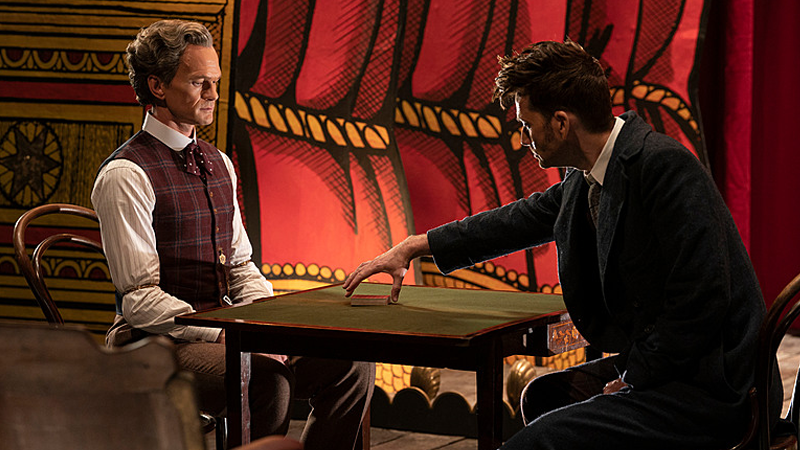
And so, here we are again. David Tennant must die, and although this time around his latest take on the Doctor is largely unware that he finds himself in a regeneration story in “The Giggle,” the brief tenure of the 14th Doctor has, as a whole, largely been about dealing with the weight of a long life lived. One of the key differences between this Doctor and the last time they wore Tennant’s face is how emotionally vulnerable and accepting of this weight the Doctor has been—the goodbyes, the sadness, the tiredness, and the trauma. Even if this time around it’s only we the audience that are aware that time is up for the 14th Doctor, his very existence has been defined by that sense of regenerative sadness anyway, and how it persists even as the Doctor changes faces. “The Giggle” isn’t just a regeneration story in this regard, this whole trio of episodes is.
Yet, they’re also a celebration of Doctor Who, and no one wants the birthday person to be glum on their big milestone. “The Giggle” is more akin to “The Star Beast” than “Wild Blue Yonder” here, a Davies-romp with high camp and a narrative weave that leans hard on performance and sentiment. The Toymaker, having escaped his realm of surreality to enter our own, has sown a seed of madness into every TV transmission—from the original John Logie Baird transmission in 1925 all the way to a 2023 where satellites have turned Earth into a truly online and connected planet—and is using this power to cause mayhem and chaos. Why? He’s petty. That’s pretty much exactly what it is, as much as he then goes on to frame this against the Doctor and Donna as some grand critique of the Doctor’s capacity to get people around him killed, that he is just as guilty of playing games as he himself is. It’s not really that deep, no matter how many creepy puppets of fallen companions he clunks down in front of them, even less so when he assaults UNIT HQ to perform a Spice Girls lip sync. The Toymaker is there because an episode of Doctor Who needs an antagonist, and as good as he is, as fun as he is, he’s not there to make a point. He’s there to pull a trigger, and get us to what “The Giggle” is meant to be about, what we expect it to be about, even in celebration—a beginning, and an end.
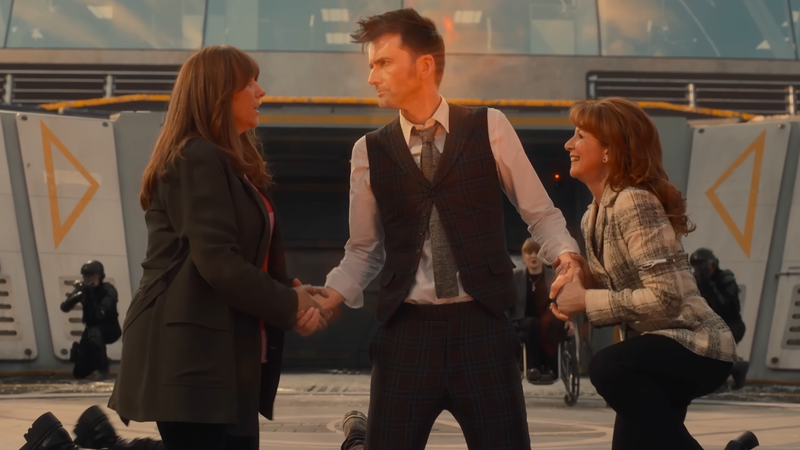
The actual twist then, more so than its seemingly game-changing methodology, is that “The Giggle” is a regeneration story, but it’s not a sad one. In fact, it wants to make regeneration freeing and transformative in a way the show has rarely touched on before: what if Doctor Who wasn’t about dying, but finding ways to live? As the clock runs out and “The Giggle” sets the stage for its grand execution—almost literally, as the Toymaker wins his “game” and shoots the Doctor clean through the chest during his UNIT assault with a giant laser gun—the Doctor this time embraces change, and is ready to say goodbye this time. Except, in doing so, just this once, they are given an opportunity, on their birthday, to have it both ways. The next Doctor is born, but the old Doctor doesn’t go away. With a push and a pull, out of David Tennant comes Ncuti Gatwa, immediately electric, fully the Doctor, and seemingly a product of Time Lord mitosis. And he’s just standing there. Next to himself! Everybody lives!
There are a million ways such an audacious idea could’ve gone wrong—not just for what this means logistically in Doctor Who from the perspective of its internal logic, but also the delicate tightrope of what it means to the audience, that you put the new Doctor, the first Black, queer man to play the Doctor, next to one of the most beloved actors to ever play the role, while saying that that actor hasn’t actually left the show (again). It speaks to Gatwa’s potential that he himself is unbothered by this daunting prospect, and neither is Doctor Who: from the moment he is born, standing up against a great foe in nothing more than a borrowed shirt and boxer shorts to play a game of catch for the fate of all existence, it is unequivocal that “The Giggle” is now his episode, not David Tennant’s. Surprised as he is to be there still, the 14th Doctor melts into the background at the 15th’s side, as he offers the greatest gift to this traumatized Time Lord he can give—a moment for the physician to heal himself.
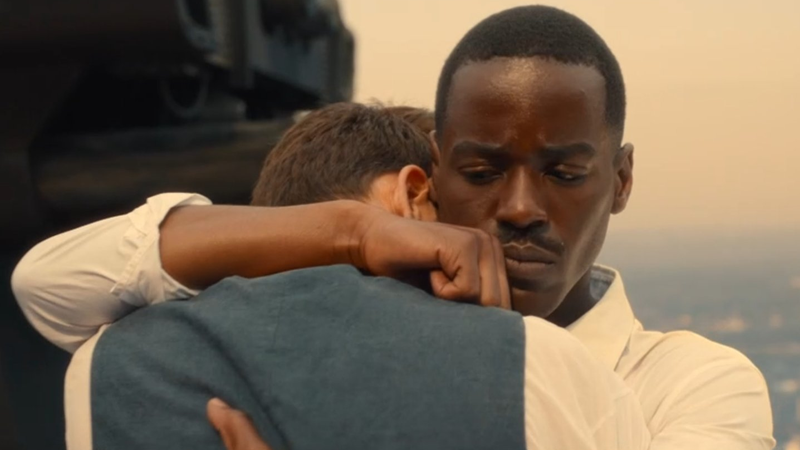
This “Bi-generation”—as 15 puts it to both himself and the gathered, confused allies around him—is supposed to be a myth, a fantasy, but in a reality where a powerful being such as the Toymaker has already pushed the established rules of existence out the window by his very presence, Doctor Who finds itself in a potentiality where anything and everything could happen. The Toymaker is, indeed, pulling the trigger, but not this time quite so literally—he is the catalyst for Doctor Who to free itself, to say everything that came before and which we understood mattered, but also, that it doesn’t matter. The Doctor is free of this inevitable sadness, that their rebirth after rebirth doesn’t have to come at the cost of death and sorrow. Somewhere, out there, in another version of reality, in another timeline, in another interpretation, every version of the Doctor gets up from their regeneration story and walks away an unchanged person.
However you interpret it is not for Doctor Who to say, not because it doesn’t care—it’s clear that Davies cares deeply in playing with regeneration itself like this, in this moment—but because this is its gift to itself, and to you. Don’t be sad that your Doctor has gone if you don’t want to be, there is now this way for them to come back, to tell more stories. If that sadness in regeneration, and its representation of change and rebirth is important to you, it still is to the show; the 15th Doctor is not an offshoot or an outside technicality, he is the Doctor’s future, with everything that entails, including the eventual evolution of his past self into this current moment. The Doctor is free, and so are we, in this singular moment, to take whatever we want from it.
And what better way to celebrate everything Doctor Who has been for 60 years, than to unchain it like this? It allows wonders, not just in the fantasy of saying every Doctor we’ve ever seen and loved is still out there, somewhere, in some version of this ongoing tale. It allows a wonder specifically, for the 14th Doctor, whose time has been defined by grappling with the tragedies that have beset the Doctor since they last had this particular face, to pause, reflect, and rest. If the 15th Doctor is the future, and a representation of, as he puts it, Time Lord rehab out of order—a living, breathing example of showing himself that one day everything will be okay—then the 14th Doctor doesn’t have to keep running, and mourning. He can settle down for the life his past selves have craved, fully of love and family alongside his best friends, living out his days on his chosen homeworld. The Doctor gets to live, in both senses of it, 14 finding peace and the chance to heal the long way round from the ground, and 15 running off into the stars to see what’s out there, full of joy and life because of that chance to heal his own past along the way.
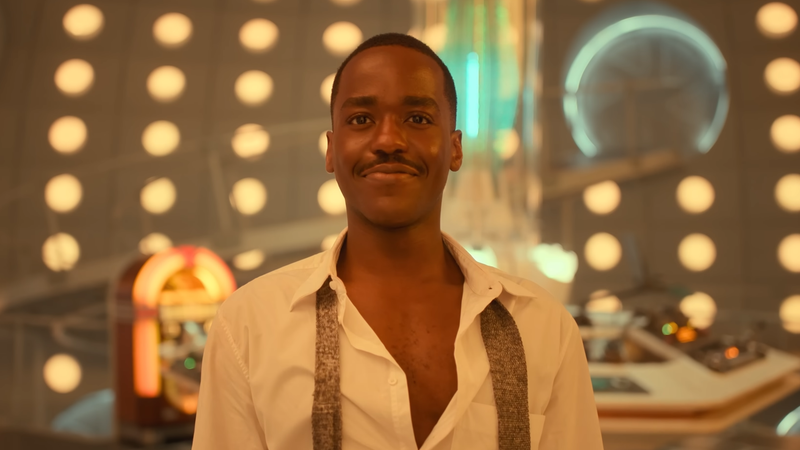
So “The Giggle,” and this very special celebration of Doctor Who’s past, its present, and its future, ends not with melancholy as we might have suspected, but this moment suffused with joy for everyone. Sitting around the Noble-Temple dinner table, the 14th Doctor tells his best friend in the whole universe that it’s the happiest he’s ever been in his life. Out there in time and space, the 15th Doctor is happier still, the whirling wheeze of the TARDIS reverberating out around him and a smile on his face, full of adventure. At this most special of moments, one carefully structured to only be able to come off out of this impossible context of this particular anniversary, everybody lives. And in doing so Doctor Who, 60 years old, 60 years younger still, allows itself the magic of having its cake and eating it too.
Want more entertainment news? Check out when to expect the latest Marvel, Star Wars, and DC releases, what’s coming to cinemas in Australia this year, and everything streaming this month across all platforms. Check out our dedicated Entertainment tab for more.
